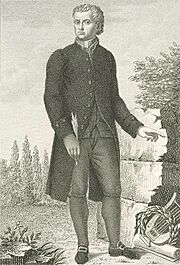Carlo Innocenzo Frugoni facts for kids
Carlo Innocenzo Frugoni (born November 21, 1692 – died December 20, 1768) was a very talented Italian poet and a writer of stories for operas (called a librettist). He was one of the best poets from a famous group called the Arcadian Academy. His poems and stories about country life were known for being very elegant and easy to enjoy. All of his writings were published in many books after he passed away.
Contents
Carlo Innocenzo Frugoni's Life Story
His Early Life and Studies
Carlo Innocenzo Frugoni was born in Genoa, Italy. When he was 15 years old, his family wanted him to join the church. He was sent to a monastery, even though he didn't want to go. The next year, he was forced to become a monk, but he really didn't like that life.
However, Carlo became very good at writing. He was known for his elegant writing in both Latin and Italian. From 1716 to 1724, he taught a subject called rhetoric at many universities. Rhetoric is the art of speaking and writing well. He taught at places like Brescia, Rome, Genoa, Bologna, and Modena. Many students came to his classes because he was such a brilliant speaker.
A Poet for the Duke
A powerful person named Cardinal Bentivoglio helped Carlo. He recommended Carlo to Antonio Francesco Farnese, who was the Duke of Parma. The Duke then made Carlo his official court poet, known as the "poet laureate." This meant Carlo wrote poems and songs for the Duke's court.
Carlo stayed at the Duke's court in Parma until the Duke died. After that, he went back to Genoa. Soon, with help from Cardinal Bentivoglio again, Carlo was allowed to leave his life as a monk. He even got back some of his family's inheritance.
Later Years and Famous Works
After a big peace agreement in 1748, Carlo returned to the court of Parma. He spent the rest of his life there, mostly writing poetry.
Carlo also wrote letters to other famous people, like Francesco Algarotti. They discussed how to turn a play by Jean Racine called Phèdre into an opera named Ippolito ed Aricia, which was composed by Tommaso Traetta. One of Carlo's students was a man named Marco Cappello, who enjoyed writing funny poems.
 | Delilah Pierce |
 | Gordon Parks |
 | Augusta Savage |
 | Charles Ethan Porter |


